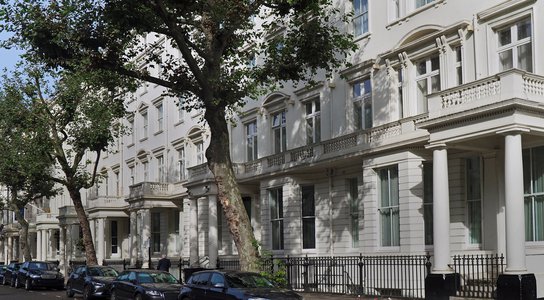Moneyland is a hidden place where an ultra-wealthy criminal elite seamlessly move themselves and their money around – picking and choosing which laws they want to be governed by. Last week at our event ‘Uncovering Moneyland: Gangsters, Guns and Investigative Journalists’, we got a glimpse into the workings of this underground world.
And it’s much closer than you might think, as Ava Lee, Anti-Corruption Campaigner at GW, and Misha Glenny, GW Board member, explained. Over 86,000 UK properties are owned by anonymous companies - transforming dirty money into apparently squeaky-clean real estate. These anonymously owned properties are especially high in Britain’s political capital, with 10,000 sitting in the City of Westminster – right under Theresa May’s nose.
Dirty money may be secreted away in London, but its journey there usually spans multiple countries – as panellist Oliver Bullough, author of Moneyland, explained. Moneyland is a transnational network where assets can be moved across borders, cash stolen in one place, stashed in another and spent in a third. If you’ve got money to hide, this is a great way to render its origins almost impenetrable.
Making it harder for the bad guys
Our trip into Moneyland, however, had some hopeful guides. Our panel discussed the positive moves the UK government have made to expose corruption, including creating an open register of people who own and control UK companies.
But it doesn’t stop with transparency. The government needs to put its money where its mouth is, and properly resource teams of people to investigate. Ava Lee described how Global Witness and DataKind UK analysed this open register - and found highly suspicious entries, including 4,000 UK companies whose real owners were supposedly just two years old. This information may raise eyebrows, but it should also raise serious investigations. Otherwise the corrupt elite can unapologetically parade their poorly disguised wealth, and transparency remains a mere technicality.
Another contemporary development in anti-corruption legislation is Unexplained Wealth Orders (otherwise known as the McMafia law – after Misha Glenny’s best-selling book and BBC adaptation). This piece of legislation, supported by Global Witness, has been upheld to reveal the concerning financial pursuits of Zamira Hajiyeva.
But two multi-million pound properties and eye-watering shopping sprees weren’t the only thing to note in Hajiyeva’s case. Ava pointed out that Hajiyeva, a typical Moneyland national, was welcomed into the UK with open arms thanks to her ‘golden visa’. Golden visa schemes offer fast-track citizenship and/or residency to foreign nationals in exchange for lots of cash. Hajiyeva came in, along with 3,000 others, with few questions asked thanks to a seven year slip up by the UK government. And it’s not just the UK - golden visas are being issued across Europe, and risk enabling corruption on an unprecedented global scale.
Undercover in Moneyland
Investigative journalists are changing the landscape of Moneyland. We were joined by Buzzfeed’s Investigations Correspondent, Jane Bradley, who described how she uses journalism to pull the plug on the corrupt. While journalists may lay the groundwork, however, political follow-through is crucial. Bradley outlined her investigation into Lycamobile, including how UK authorities failed to act on suspected money laundering - because of Lyca's donations to the Conservative Party.
This inaction is frustrating – especially given the life-threatening lengths journalists go to when revealing corruption scandals. This reminder was painfully apt, arriving alongside the one-year anniversary of journalist Daphne Caruana Galizia’s tragic assassination, the recent horrific murder of journalist Viktoria Marinova, and the deeply disturbing disappearance of journalist Khashoggi in the Saudi consulate in Istanbul. Our panel denounced these mafia-style murders, while highlighting that no one has been prosecuted: people inhabiting Moneyland appear to receive impunity.
Closing the door on Moneyland
Moneyland may exist in another dimension, but it has real and devastating consequences in this one. Jane Bradley emphasised that money laundering is not a bloodless crime. Investigative journalists must be awarded the protection they need to conduct frontline work.
After everything we learnt last week about Moneyland, one message is resoundingly clear: we need to make it harder for the bad guys to live there. The UK’s legislative framework has the potential to lift the lid on the underground workings of Moneyland - from Unexplained Wealth Orders against crooks like Hajiyeva, to open registers revealing ‘real company owners’ running businesses before they can talk. But adequate resourcing is needed for this promising legislation to be properly enforced. Without it, in the words of Oliver Bullough, we’re left fighting tanks with paper swords.


